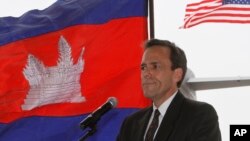US Ambassador William Todd writes a weekly column for local news, translated into Khmer. Readers send their questions to the ambassador via email, and the column goes out to a wide readership.
Through the column Todd has weighed in on serious political topics, including the detention of opposition activists and the importance of young voters to the country’s democracy.
Some officials may not like what he has to say, but the “Ask the Ambassador” column has proven popular nonetheless.
Readers like Hey Salim, from Sihanoukville, say the column does well at focusing on political affairs, democracy and US assistance to Cambodia. But he says there are even more issues the ambassador could focus on.
“I suggest he try his best to strengthen democracy and human rights in Cambodia,” Hey Salim told VOA Khmer. “For land disputes in Cambodia, for example, we would like the US to talk to the Cambodian government and urge them to find a solution for landless people. On economic land concessions, especially, they should stop allowing private companies to destroy forests and prevent government officials from grabbing people’s land.”
Jay Raman, a spokesman for the embassy, said the ambassador’s column tries to focus on topics that are relevant to readers. “He wants to respond to the concerns of ordinary Cambodians and to answer the questions that they have,” Raman said.
The popular column, which first ran in June 2012, is just one outlet for the ambassador, who also maintains a personal blog and uses the embassy’s Facebook account. The column is written in English, then translated into Khmer, and runs in newspapers like Reasmey Kampucha, the Cambodia Herald and the Cambodia Express News. It is shared and shared again on Facebook. Readers can send in their questions to AskAMBToddPP@state.gov.
The ambassador has proven willing to tackle tough topics in Cambodia’s fractious political climate.
After the July 2013 elections, when seven opposition members were detained by authorities, Todd encouraged their release. He later wrote on the need for political parties to reach a deal after a “tumultuous year” following the elections.
In May, he addressed the need for more employment opportunities for the young. “Young people are three times more likely to be unemployed than older people,” he wrote. “And they are finding that, even with graduate degrees, they may not have the skills that the marketplace is seeking.”
The ambassador also writes on the need for political reform.
“Many Cambodians have told me that what they mean by change is reform, not just political reform but reform that improves the lives of average people,” he wrote in one column.
In another, earlier this month, he said cooperation between the ruling Cambodian People’s Party and the opposition Cambodia National Rescue Party was “giving the Cambodian people greater confidence that the democratic process can be effective and will benefit them in their daily lives.”
These are thorny topics, all, and the ambassador’s thoughts may not always welcome by those in power.
Government spokesman Phay Siphan said officials are sometimes “surprised” by the issues raised in the column, “which does not seem to be a policy from Washington.”
“It seems that this is is his personal work, and this seems abnormal compared to other diplomats in Cambodia,” Phay Siphan said. He suggested the ambassador spend more time explaining US policies to readers.
“Doing so would help maintain mutual interests between the two countries,” he said. “Therefore the US should start mending its foreign policy with Cambodia, to be more specific than now, so that more work can continue without any misunderstandings.”
That opinion is not shared by all, however, even within the ruling party. CPP lawmaker Chheang Von, who chairs the National Assembly’s foreign committee, said the attention the ambassador focuses on the youth and other issues contributes to Cambodia’s effort to overcome the challenges it is facing.
“We, the government and parliament, cannot see everything,” Chheang Von said. “Civil society groups and diplomats can also help, by telling us what concerns the youth have. We also know this, but there is no harm if they add more comments. We support it, if it’s constructive and non-partisan criticism.”
Ou Virak, chairman of the board at the Cambodian Center for Human Rights, said the column likely has more impact on the youth. “Young people pay special attention to the US and Western embassies,” he said, noting that the number of likes on Facebook goes up whenever the ambassador discusses a topic.
Yim Sovann, a spokesman for the oppostion, said the column can sometimes help their cause.
“This is very important, because the opposition has raised concerns, and if there are diplomats weighing in on those, it’s ideal,” he said. “We want constructive ideas on how to overcome our challenges. We Khmer seem not to listen to each other.”







